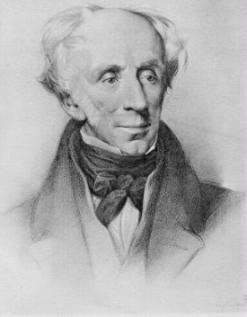William Wordsworth (April 7, 1770 – April 23, 1850) was a major English romantic poet who, with Samuel Taylor Coleridge, helped launch the Romantic Age in English literature with their 1798 joint publication, Lyrical Ballads. Wordsworth's masterpiece is generally considered to be The Prelude, an autobiographical poem of his early years that was revised and expanded a number of times. It was never published during his lifetime, and was only given the title after his death. Up until this time it was generally known as the poem "to Coleridge". Wordsworth was England's Poet Laureate from 1843 until his death in 1850.
Biography
The second of five children of John Wordsworth (b. 1741), Wordsworth was born in Cumberland—part of the scenic region in north-west England called the Lake District. His sister was the poet and diarist Dorothy Wordsworth. With the death of his mother in 1778, his father sent him to Hawkshead Grammar School. In 1783 his father, who was a lawyer and the solicitor for the Earl of Lonsdale (a man much despised in the area), died. The estate consisted of around £4500 Three years later, in 1790, he visited Revolutionary France and supported the Republican movement. The following year, he graduated from Cambridge without distinction.
Early life and education
In November 1791, Wordsworth returned to France and took a walking tour of Europe that included the Alps and Italy. He fell in love with a French woman, Annette Vallon, who in 1792 gave birth to their child, Caroline. Because of lack of money and Britain's tensions with France, he returned alone to England the next year.
Relationship with Annette Vallon
1793 saw Wordsworth's first published poetry with the collections An Evening Walk and Descriptive Sketches. He received a legacy of £900 from Raisley Calvert in 1795 so that he could pursue writing poetry. That year, he also met Samuel Taylor Coleridge in Somerset. The two poets quickly developed a close friendship. In 1797, Wordsworth and his sister, Dorothy, moved to Somerset, just a few miles away from Coleridge's home in Nether Stowey. Together, Wordsworth and Coleridge (with insights from Dorothy) produced Lyrical Ballads (1798), an important work in the English Romantic movement. The volume had neither the name of Wordsworth nor Coleridge as author. One of Wordsworth's most famous poems, "Tintern Abbey", was published in the work, along with Coleridge's "The Rime of the Ancient Mariner". The second edition, published in 1800, had only Wordsworth listed as author, and included a preface to the poems, which was significantly augmented in the 1802 edition. This Preface to Lyrical Ballads is considered a central work of Romantic literary theory. In it, Wordsworth discusses what he sees as the elements of a new type of poetry, one based on the "real language of men" and which avoids the poetic diction of much eighteenth-century poetry. Here, Wordsworth also gives his famous definition of poetry as "the spontaneous overflow of powerful feelings from emotions recollected in tranquility." A fourth and final edition of Lyrical Ballads was published in 1805.
Germany and move to the Lake District
In 1802, after returning from his trip to France with Dorothy to visit Annette and Caroline, Wordsworth received the inheritance owed by Lord Lonsdale since John Wordsworth's death in 1783. Later that year, he married a childhood friend, Mary Hutchinson. Dorothy continued to live with the couple and grew close to Mary. The following year, Mary gave birth to the first of five children, John.
Both Coleridge's health and his relationship to Wordsworth began showing signs of decay in 1804. That year Wordsworth befriended Robert Southey. With Napoleon's rise as Emperor of the French, Wordsworth's last wisp of liberalism fell, and from then on he identified himself as a Tory.
 Marriage
MarriageWordsworth had for years been making plans to write a long philosophical poem in three parts, which he intended to call The Recluse. He had in 1798–99 started an autobiographical poem, which he never named but called the "poem to Coleridge", which would serve as an appendix to The Recluse. In 1804 he began expanding this autobiographical work, having decided to make it a prologue rather than an appendix to the larger work he planned. By 1805, he had completed it, but refused to publish such a personal work until he had completed the whole of The Recluse. The death of his brother, John, in 1805 affected him strongly.
The source of Wordsworth's philosophical allegiances as articulated in The Prelude and in such shorter works as "Lines composed a few miles above Tintern Abbey" has been the source of much critical debate. While it had long been supposed that Wordsworth relied chiefly on Coleridge for philosophical guidance, more recent scholarship has suggested that Wordsworth's ideas may have been formed years before he and Coleridge became friends in the mid 1790s. While in Revolutionary Paris in 1792, the twenty-two year old Wordsworth made the acquaintance of the mysterious traveler John "Walking" Stewart (1747-1822),
Autobiographical work and Poems in Two Volumes
In 1814 he published The Excursion as the second part of the three-part The Recluse. He had not completed the first and third parts, and never would complete them. However, he did write a poetic Prospectus to "The Recluse" in which he lays out the structure and intent of the poem. The Prospectus contains some of Wordsworth's most famous lines on the relation between the human mind and nature:
My voice proclaims
How exquisitely the individual Mind
(And the progressive powers perhaps no less
Of the whole species) to the external World
Is fitted:--and how exquisitely, too,
Theme this but little heard of among Men,
The external World is fitted to the Mind . . .
Some modern critics recognise a decline in his works beginning around the mid-1810s. But this decline was perhaps more a change in his lifestyle and beliefs, since most of the issues that characterise his early poetry (loss, death, endurance, separation, abandonment) were resolved in his writings. But, by 1820 he enjoyed the success accompanying a reversal in the contemporary critical opinion of his earlier works.
By 1828, Wordsworth had become fully reconciled to Coleridge, and the two toured the Rhineland together that year.
Dorothy suffered from a severe illness in 1829 that rendered her an invalid for the remainder of her life. In 1835, Wordsworth gave Annette and Caroline the money they needed for support.
The Prospectus
Wordsworth received an honorary Doctor of Civil Law degree in 1838 from Durham University, and the same honour from Oxford University the next year. In 1842 the government awarded him a civil list pension amounting to £300 a year.
With the death in 1843 of Robert Southey, Wordsworth became the Poet Laureate. When his daughter, Dora, died in 1847, his production of poetry came to a standstill.
The Poet Laureate and other honours
William Wordsworth died in Rydal Mount in 1850 and was buried at St. Oswald's church in Grasmere.
His widow published his lengthy autobiographical "poem to Coleridge" as The Prelude several months after his death. Though this failed to arouse great interest in 1850, it has since come to be recognised as his masterpiece. The lives of Wordsworth and Coleridge, in particular their collaboration on the "Lyrical Ballads," are discussed in the 2000 film Pandaemonium.
 Death
DeathLyrical Ballads, with a Few Other Poems (1798)
- "Simon Lee"
"We Are Seven"
"Lines Written in Early Spring"
"Expostulation and Reply"
"The Tables Turned"
"The Thorn"
"Lines Composed A Few Miles above Tintern Abbey"
Lyrical Ballads, with Other Poems (1800)
- Preface to the Lyrical Ballads
"Strange fits of passion I have known"
"Lucy Gray"
"The Two April Mornings"
"Nutting"
"The Ruined Cottage"
"Michael"
Poems, in Two Volumes (1807)
- "Resolution and Independence"
"I wandered lonely as a cloud"
"My heart leaps up"
"Ode: Intimations of Immortality"
"Ode to Duty"
"The Solitary Reaper"
"Elegiac Stanzas"
"Composed upon Westminster Bridge, September 3, 1802"
"London, 1802"
"The world is too much with us"
The Excursion (1814)
- "Prospectus to The Recluse"
Ecclesiastical Sketches (1822)
- "Mutability"
The Prelude (1850, posthumous)
- The Prelude; or, Growth of a Poet's Mind Major works
Wordsworth suffered from Anosmia.
Wordsworth was the first to coin the term "miller blue". He referred to it in his autobiographical poem "The Prelude" when he empathized with the difficulties of the indigo dye workers of his home town of Cockermouth. Miller blue was an homage to the fact that Cockermouth was a mill town and the dye workers suffered the hazards of the indigo dye industry. Notes
M. H. Abrams, ed. (2000), The Norton Anthology of English Literature: Volume 2A, The Romantic Period (7th ed.), New York: W. W. Norton & Company, Inc., ISBN 0-393-97568-1
Stephen Gill, ed. (2000), William Wordsworth: The Major Works, New York: Oxford University Press, Inc., ISBN 0-19-284044-4
- The Prelude; or, Growth of a Poet's Mind Major works
- "Mutability"
- "Prospectus to The Recluse"
- "Resolution and Independence"
- Preface to the Lyrical Ballads

No comments:
Post a Comment